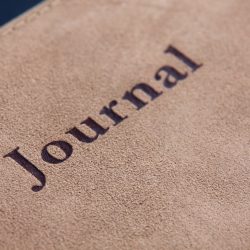A journal is a place where we give expression to the fountain of our heart…
~ Donald S. Whitney ~
Most people don’t think about journaling as a means for discovering how to make good career choices. Journaling can be a valuable “power tool” in your toolbox for doing exactly that.
- Are you interested in living a life that you designed?
- Are you willing control your decisions and be accountable for your life?
- Do you want to get to know what matters to you at the deepest level?
A life where you make good career choices requires you to know who you are and what you want. You need to know your preferences, your personality, and how you want to live.
Journaling gives you a safe place to delve into those aspects of yourself that may be hidden from your view. A journal is a place to explore:
- Patterns that deepen your understanding of how you think
- Limiting beliefs you may not be consciously aware of
- Old wounds and how to let them go
- Values, likes and dislikes
- Failures so you learn from them
- Successes so you can repeat them
- Strategies for what kinds of career choices you’d like to pursue
You have a unique personality and approach to your career and your life. If you’re not tuned in to who you are and what you want, it’s quite difficult to make career choices that make you happy, excited, motivated, fulfilled, and challenged.
It’s not always easy to live a self-aware life. It is simple, however. Carolyn Myss says that as you become self-aware, the choices available to you become fewer, but much more powerful.
What is Journaling?
Journaling gets a bad rap. People sometimes equate it with being back in junior high school and keeping a diary they have to hide under the mattress. As an adult, however, you can consciously choose journaling to identify and clarify your feelings, thoughts, and plans.
The path to self-awareness is challenging. Denial, fear, and other emotions can get in the way. Journaling is a habit you can develop help you find your path through the minefield to making the best career choices for you.
What is the Best Approach?
There are many approaches to journaling. The only “right” approach is the one you’ll use. Experiment with a variety of methods until you find one that works best. Here are some examples:
- The Artist’s Way method. Write three pages stream of consciousness. A great website tool for this is 750Words.com
- Pose specific questions to yourself about possible career choices such as:
- What are my strengths?
- What do I value?
- What legacy would I like to leave?
- What career choices would allow me to bring my strengths, values, and leaving a legacy together?
- What would my perfect workday, workplace, and co-workers be like?
- What support do I need to help me discover the best career choices for me?
- What education or training would I need?
- Journal your answers. You can journal about each question separately, or about all of them. It’s up to you.
Writing down your answers helps you to gain objectivity. With objectivity, you are better able to see what career choices are best for you.
How to Get Started Journaling
Choose the tool that’s best for you. Think about your preferences and personality type.
- What type of device would you like to use for journaling? Laptop, smart device, or pen and paper?
- What time of day would you prefer to journal? First thing in the morning or last thing at night are the most reflective times of day for many people.
- What kind of environment to you prefer? Indoors or out? Meditation music or silence?
Gather your materials, and start making journaling a habit. Begin asking and answering power questions that will help you learn who you are, what you want, and where you’re taking your career and life.
You may find your ideas about career choices trickling out at first, but if you stick with it, you’ll soon be tapping into the “fountain of your heart”.
Do you journal? What’s the most valuable part of it for you? Share in the comments.
Looking for some other tools for helping you make great career choices? A Personal Insights Profile can help! Contact me for details.

